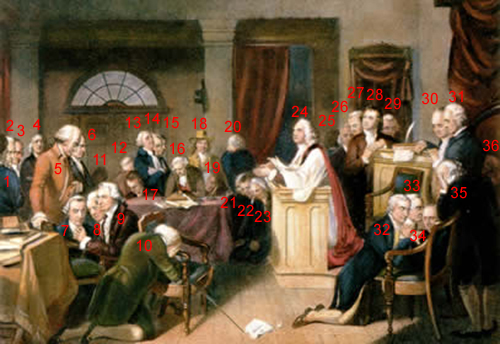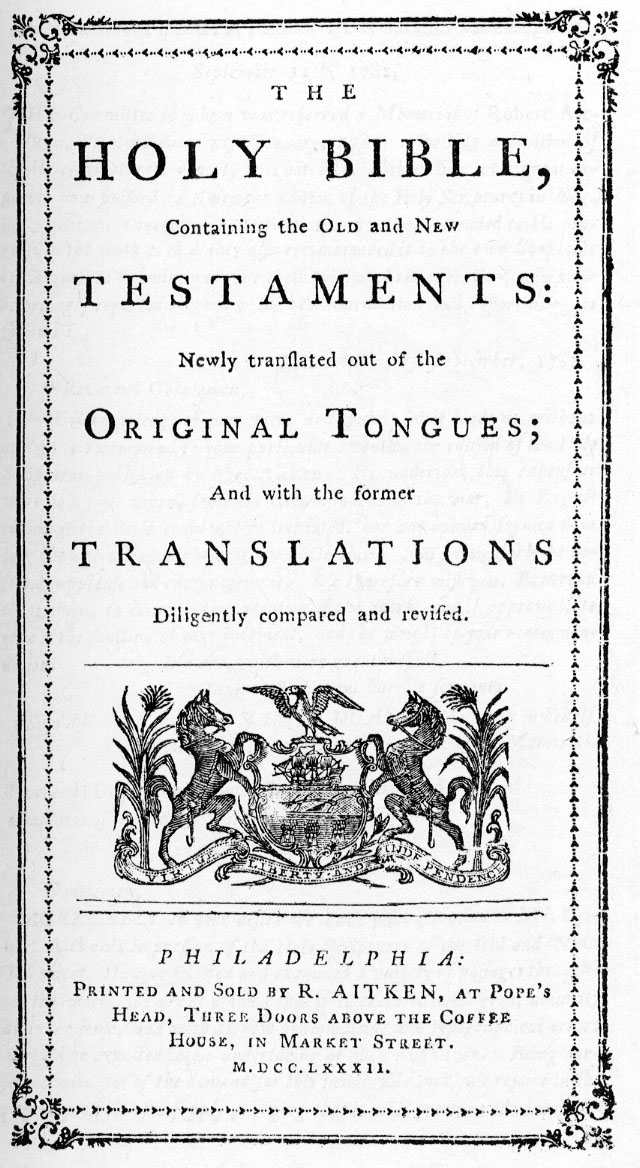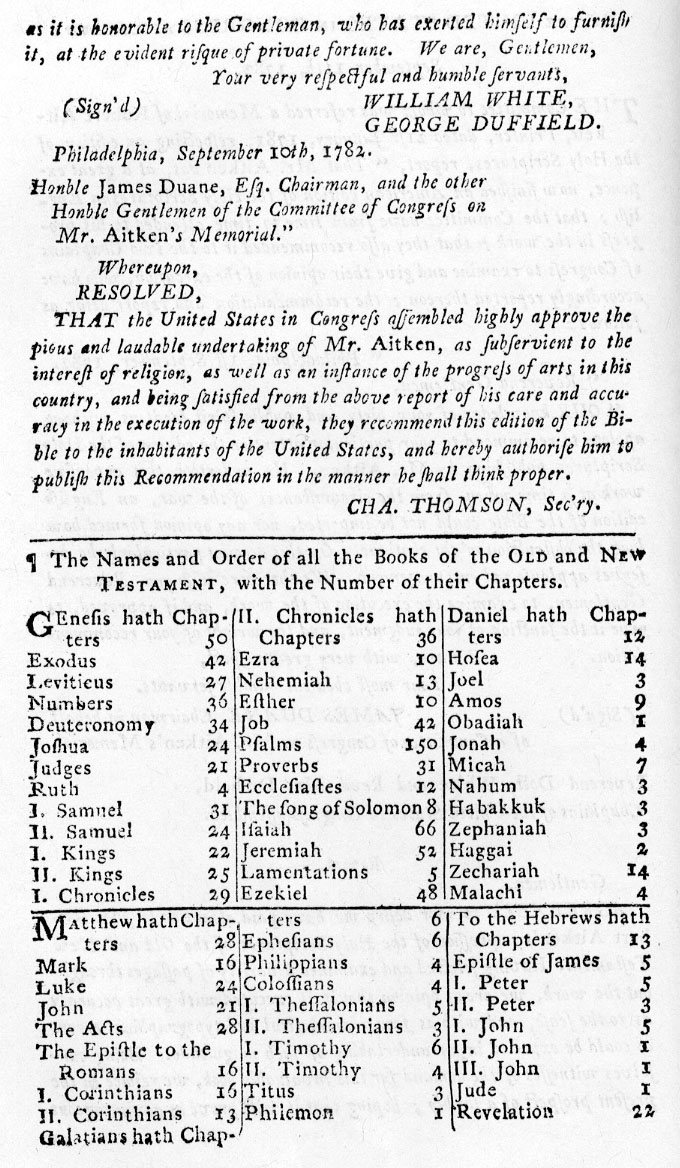|
Continental Congress Sept. 6 1774, their first official act was a call to prayer. "Tuesday, September 6, 1774. Resolved, That the Rev. Mr. Duché be desired to open the Congress tomorrow morning with prayers, at the Carpenter's Hall, at 9 o'clock." The First Prayer in Congress Held in Carpenters Hall Philadelphia - September 7, 1774
When the Congress met, Mr. Cushing made a motion that it should be opened with Prayer. It was opposed by Mr. Jay of New York and Mr. Rutledge of South Carolina because we were so divided in religious sentiments, some Episcopalians, some Quakers, some Anabaptists, some Presbyterians and some Congregationalists, that we could not join in the same act of worship. Mr. Samuel Adams arose and said, "that he was no bigot; and could hear a Prayer from any gentleman of Piety and virtue who was at the same time a friend to his Country. He was a stranger in Philadelphia, but had heard that Mr. Duche' deserved that character and therefore he moved that Mr. Duche' an Episcopal clergy man, might be desired to read Prayers to Congress tomorrow morning." The motion was seconded, and passed in the affirmative. Mr. Randolph, our president waited on Mr. Duche' and received for answer, that if his health would permit, he certainly would. Accordingly next morning he appeared with his clerk and in his pontificals, and read several Prayers in the established form and then read the Psalter for the seventh day of September which was the 35th Psalm. You must remember this was the next morning after we had heard the rumor of the horrible cannonade of Boston, "it seemed as if Heaven had ordained that Psalm to be read on that morning." After this, Mr Duche' unexpectedly to everybody, struck out into extemporary Prayer, which filled the bosom of every man present. I must confess I never heard a better Prayer, one so well pronounced. Episcopalian as he is, Dr. Cooper himself never prayed with such fervor, such order, such correctness, and pathos, and in language so elegant and sublime for America, for Congress, for the Province of Massachusetts Bay, especially the town of Boston. It had excellent effect upon every body here. I must beg you to read the Psalm. Here was a scene worthy of the printers art. It was in Carpenter's Hall, in Philadelphia, a building which still survives, that the devoted individuals met to whom this service was read. Washington was kneeling there, and Henry, Randolph, Rutledge, Lee, and Jay, and by their side there stood bowed in reverence, the Puritan Patriots of New England, who at that moment had reason to believe that an armed soldiery was wasting their humble households. It was believed that Boston had been bombarded and destroyed. They prayed fervently "for America, for Congress, for the Province of Massachusetts Bay, and especially for the town of Boston," and who can realize the emotion with which they turned imploringly to Heaven for Divine interposition and - "It was enough" says Mr. Adams, "to melt a heart of stone. I saw the tears gush into the eyes of the old, grave pacific Quakers of Philadelphia." Mr. Duche's Prayer Be Thou present; O God of Wisdom, and direct the councils of this Honorable Assembly: enable them to settle all things on the best and surest foundations: that the scene of blood may be speedily closed: that Order, Harmony and Peace may be effectually restored, and Truth, and Justice, Religion, and Piety prevail and flourish among the people. Preserve the health of their bodies and the vigor of their minds, shower down on them, and the millions they here represent, such temporal Blessings as Thou seest expedient for them in this world, and crown them with everlasting Glory in the world to come. All this we ask in the name and through the merits of Jesus Christ Thy Son and Our Savior. Amen Continental Congress On Sept. 11, 1777 approved the import of 20,000 copies of the Holy Bible, in response to the shortage caused by the Revolutionary War. "The use of the Bible is so universal and its importance so great that your committee refers the above to the consideration of Congress, and if Congress shall not think it expedient to order the importation of types and paper, the Committee recommends that Congress will order the Committee of Commerce to import 20,000 Bibles from Holland, Scotland, or elsewhere, into the different parts of the States of the Union. Whereupon it was resolved accordingly to direct said Committee of Commerce to import 20,000 copies of the Bible." Continental Congress Nov. 1, 1777 Congress issued its first National Proclamation of Thanksgiving. "Forasmuch as it is the indispensable duty of all men to adore the superintending Providence of Almighty God; to acknowledge with gratitude their obligation to Him for benefits received and to implore such further blessing as they stand in need of; and it having pleased Him in His abundant mercy not only to continue to us the innumerable bounties of His common Providence... to smile upon us as in the prosecution of a just necessary war for the defense and establishment of our unalienable rights and liberties... It is therefore recommended to the legislative or executive powers of these United States, to set apart Thursday, the eighteenth day of December next, for the solemn thanksgiving and praise: That with one heart and one voice the good people may express the grateful feelings of their hearts, and consecrate themselves to the service of their Divine Benefactor; and that together with their sincere acknowledgements and offerings, they may join the penitent confession of their manifold sins, whereby they had forfeited every favour, and their humble and earnest supplication that it may please God, though the merits of Jesus Christ, mercifully to forgive and blot them out of remembrance; That it may please Him graciously to afford His blessings on the governments of these states respectively, and prosper the public council of the whole; to inspire our commanders both by land and sea, and all under them, with that wisdom and fortitude which may render them fit instruments, under the Providence of Almighty God, to secure for these United States, the greatest of all human blessings, independence and peace; That it may please Him, to prosper the trade and manufactures of the people, and the labour of the husbandman, that our land may yet yield its increase; to take school and seminaries of education, so necessary for cultivating the principles of true liberty, virtue and piety, under His nurturing hand, and to prosper the means of religion for the promotion and enlargement of that kingdom which consisteth "in righteous, peace and joy in the Holy Ghost. Continental Congress Oct. 18,1780 Congress issued a Proclamation for a Day of Public Thanksgiving and Prayer. "Whereas it hath pleased Almighty God, the Father of all mercies, amidst the vicissitudes and calamities of war, to bestow blessings on the people of these states, which call for their devout and thankful acknowledgements, more especially in the late remarkable interposition of his watchful providence, in the rescuing the person of our Commander-in-Chief and the army from imminent dangers, at the moment when treason was ripened for execution... It is therefore recommended to the several states... a day of public thanksgiving and prayer, that all the people may assemble on that day to celebrate the praises of our Divine Benefactor; to confess our unworthiness of the least of his favours, and to offer our fervent supplications to the God of all grace... to cause the knowledge of Christianity to spread over all the earth." Articles of Confederation Ratified by the States this day, March 1, 1781 "Whereas the delegates of the United States of America in Congress assembled did on the fifteenth day of November in the Year of Our Lord 1777, and in the second year of the independence of America agree on certain Articles of Confederation and perpetual union between the States... The said states hereby severally enter into a firm league of friendship with each other, for their common defense, the security of their liberties, and their mutual and general welfare, binding themselves to assist each other, against all force offered to, or attacks made upon them, or any of them, on account of religion, sovereignty, trade, or any other pretense... And whereas it has pleased the Great Governor of the World to incline the hearts of the Legislatures we respectively represent in Congress, to approve of, and to authorize us to ratify the said Articles of Confederation. In Witness whereof we have hereunto set our hands in Congress. Done at Philadelphia in the State of Pennsylvania the ninth day of July in the Year of our Lord One Thousand Seven Hundred and Seventy-Eight, and in the Third Year of the independence of America."
Congress of the Confederation Sept. 10, 1782 in response to the need for Bibles Congress granted approval to print -- "a neat edition of the Holy Scriptures for the use of schools." This endorsement of Congress was printed on its front page:
"Whereupon, Resolved, That the United States in Congress assembled... recommend this edition of the Bible to the inhabitants of the United States, and hereby authorize [Robert Aitken] to publish this recommendation in the manner he shall think proper." Congress of the Confederation This peace treaty was ratified with Great Britain in 1783. "In the name of the Most Holy and Undivided Trinity. It having pleased the Divine Providence to dispose the hearts of the most serene and most potent Prince George the Third, by the Grace of God, King of Great Britain, France, and Ireland, Defender of the Faith,... and of the United States of America, to forget all past misunderstandings and differences..." United States Congress On May 1, 1789 Congress approved to elect Rev. William Linn as Chaplain in the House and Reverend Bishop Samuel Provost as its Chaplain in the Senate. They were paid a $500 salary from the Federal Treasury. United States Congress Aug. 4, 1789, Congress repassed the Northwest Ordinance; it was first passed under the Articles of the Confederation. It established the requirements for territories seeking statehood. President George Washington signed it into law on Aug. 7, 1789, during the same time period the First Amendment was being debated. "Article III Religion, morality, and knowledge, being necessary to good government and the happiness of mankind, schools and the means of education shall forever be encouraged." United States Congress March 27,1854, a report from Mr. Meacham of the House Committee "At the time of the adoption of the Constitution and the amendments, the universal sentiment was that Christianity should be encouraged, not any one sect [denomination]. Any attempt to level and discard all religion would have been viewed with universal indignation. The object was not to substitute Judaism or Mohammedanism, of infidelity [Atheism], but to prevent rivalry among the [Christian] sects to the exclusion of others. It [Christianity] must be considered as the foundation on which the whole structure rests. Laws will not have permanence or power without the sanction of religious sentiment, -- without a firm belief that there is a Power above us that will reward our virtues and punish our vices. In this age there can be no substitute for Christianity: that, in its general principles, is the great conservative element on which we must rely for the purity and permanence of free institutions. That was the religion of the founders of the republic, and they expected it to remain the religion of their descendants. There is a great and very prevalent error on this subject in the opinion that those who organized this Government did not legislate on religion."
| ||||||||||||||||||||||||||||||||||


